热词翻译:“新的动荡变革期”英文怎么说?
“新的动荡变革期”英文怎么说?
根据热词译领导讲话翻译数据库,在《习近平在金砖国家领导人第十六次会晤上的讲话》的翻译中,“新的动荡变革期”被翻译为:
新的动荡变革期
a new period defined by turbulence and transformation
a new period defined by turbulence and transformation
例句如下:
当前,世界进入新的动荡变革期,面临关键抉择。是任由世界动荡不安,还是推动其重回和平发展的正道?我想到俄罗斯作家车尔尼雪夫斯基的著作《怎么办?》,书中主人公的坚强意志和奋斗激情,正是当前我们所需要的精神力量。时代的风浪越大,我们越要勇立潮头,以坚韧不拔之志、敢为人先之勇、识变应变之谋,把金砖打造成促进“全球南方”团结合作的主要渠道、推动全球治理变革的先锋力量。
As the world enters a new period defined by turbulence and transformation, we are confronted with pivotal choices that will shape our future. Should we allow the world to descend into the abyss of disorder and chaos, or should we strive to steer it back on the path of peace and development? This reminds me of a novel by Nikolay Chernyshevsky entitled What Is to Be Done? The protagonist’s unwavering determination and passionate drive are exactly the kind of willpower we need today. The more tumultuous our times become, the more we must stand firm at the forefront, exhibiting tenacity, demonstrating the audacity to pioneer and displaying the wisdom to adapt. We must work together to build BRICS into a primary channel for strengthening solidarity and cooperation among Global South nations and a vanguard for advancing global governance reform.
As the world enters a new period defined by turbulence and transformation, we are confronted with pivotal choices that will shape our future. Should we allow the world to descend into the abyss of disorder and chaos, or should we strive to steer it back on the path of peace and development? This reminds me of a novel by Nikolay Chernyshevsky entitled What Is to Be Done? The protagonist’s unwavering determination and passionate drive are exactly the kind of willpower we need today. The more tumultuous our times become, the more we must stand firm at the forefront, exhibiting tenacity, demonstrating the audacity to pioneer and displaying the wisdom to adapt. We must work together to build BRICS into a primary channel for strengthening solidarity and cooperation among Global South nations and a vanguard for advancing global governance reform.
热词链接
“新的动荡变革期”在其他来源中的翻译:
1 《李强在第20届东亚峰会上的讲话》中“新的动荡变革期”的翻译
当前,国际形势继续发生深刻变化,世界进入新的动荡变革期,和平与发展面临许多新的风险挑战。在这样的背景下,习近平主席着眼应对世界变局、破解紧迫难题,郑重提出全球治理倡议,强调奉行主权平等、遵守国际法治、践行多边主义、倡导以人为本、注重行动导向。这具有很强的现实针对性,与东亚峰会的主旨高度契合。中方愿同各方坚守东亚峰会的初心,围绕全球治理倡议积极行动,共同努力为地区和平与发展注入更多正能量。
At present, the international landscape continues to undergo profound changes. The world is in a new period of turbulence and transformation, with new risks and challenges facing peace and development. Against that background, President Xi Jinping has formally put forward the Global Governance Initiative (GGI) to address changes in the world and tackle pressing problems, highlighting the imperative of adhering to sovereign equality, abiding by international rule of law, practicing multilateralism, advocating the people-centered approach and focusing on taking real actions. This is very relevant in today’s world, and is fully consistent with the EAS founding mission. China will work with all parties to ensure that this mission is observed, and take vigorous actions to promote the GGI to boost peace and development of our region.
At present, the international landscape continues to undergo profound changes. The world is in a new period of turbulence and transformation, with new risks and challenges facing peace and development. Against that background, President Xi Jinping has formally put forward the Global Governance Initiative (GGI) to address changes in the world and tackle pressing problems, highlighting the imperative of adhering to sovereign equality, abiding by international rule of law, practicing multilateralism, advocating the people-centered approach and focusing on taking real actions. This is very relevant in today’s world, and is fully consistent with the EAS founding mission. China will work with all parties to ensure that this mission is observed, and take vigorous actions to promote the GGI to boost peace and development of our region.
2 《习近平在“上海合作组织+”会议上的讲话》中“新的动荡变革期”的翻译
今年是世界反法西斯战争胜利和联合国成立80周年,是铭记历史、共创未来的重要时刻。80年前,两次世界大战的浩劫让国际社会痛定思痛,联合国应运而生,全球治理掀开新的一页。80年后,和平、发展、合作、共赢的时代潮流没有变,但冷战思维、霸权主义、保护主义阴霾不散,新威胁新挑战有增无减,世界进入新的动荡变革期,全球治理走到新的十字路口。
This year marks the 80th anniversary of the victory of the World Anti-Fascist War and the founding of the United Nations. It is a milestone prompting us to remember the past and create a better future together. Eighty years ago, the international community learned profound lessons from the scourge of two world wars and founded the United Nations, thus writing a new page in global governance. Eighty years later, while the historical trends of peace, development, cooperation and mutual benefit remain unchanged, the Cold War mentality, hegemonism and protectionism continue to haunt the world. New threats and challenges have been only increasing. The world has found itself in a new period of turbulence and transformation. Global governance has come to a new crossroads.
This year marks the 80th anniversary of the victory of the World Anti-Fascist War and the founding of the United Nations. It is a milestone prompting us to remember the past and create a better future together. Eighty years ago, the international community learned profound lessons from the scourge of two world wars and founded the United Nations, thus writing a new page in global governance. Eighty years later, while the historical trends of peace, development, cooperation and mutual benefit remain unchanged, the Cold War mentality, hegemonism and protectionism continue to haunt the world. New threats and challenges have been only increasing. The world has found itself in a new period of turbulence and transformation. Global governance has come to a new crossroads.
3 《习近平在越南媒体发表署名文章》中“新的动荡变革期”的翻译
当前,世界之变、时代之变、历史之变正以前所未有的方式展开,世界进入新的动荡变革期。面对单边主义、保护主义抬头,中国经济迎难而上,2024年实现5%的增长,对世界经济增长贡献率保持在30%左右,继续成为世界经济重要引擎。中国新能源产业、人工智能和动画影视全球瞩目。中国将坚持以高水平对外开放为世界提供更多机遇,以自身高质量发展助推各国共同发展。
Today, global, epoch-making and historical changes are unfolding like never before, and the world has entered a new period of turbulent transformation. Despite the headwinds of mounting unilateralism and protectionism, the Chinese economy expanded by five percent in 2024, contributing around 30 percent to the global economy. It remains a key engine of the world economy. China’s new energy sector, artificial intelligence and animated films have come into global spotlight. China will continue to provide more opportunities to the world with its high-standard opening up and contribute to the development of all countries with its high-quality development.
Today, global, epoch-making and historical changes are unfolding like never before, and the world has entered a new period of turbulent transformation. Despite the headwinds of mounting unilateralism and protectionism, the Chinese economy expanded by five percent in 2024, contributing around 30 percent to the global economy. It remains a key engine of the world economy. China’s new energy sector, artificial intelligence and animated films have come into global spotlight. China will continue to provide more opportunities to the world with its high-standard opening up and contribute to the development of all countries with its high-quality development.

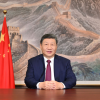 国家主席习近平发表二〇二六年新年贺词
国家主席习近平发表二〇二六年新年贺词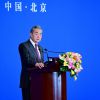 在历史演进重大关头开拓中国特色大国外交新境界
在历史演进重大关头开拓中国特色大国外交新境界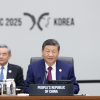 习近平在亚太经合组织第三十二次领导人非正式会议第一阶段会议上的讲话
习近平在亚太经合组织第三十二次领导人非正式会议第一阶段会议上的讲话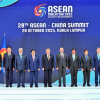 李强在第28次中国—东盟领导人会议上的讲话
李强在第28次中国—东盟领导人会议上的讲话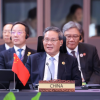 李强在第20届东亚峰会上的讲话
李强在第20届东亚峰会上的讲话